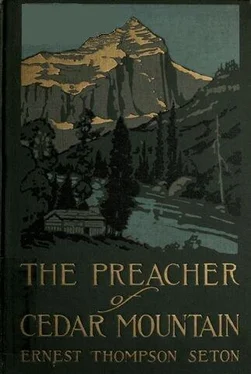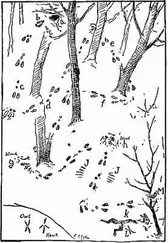Ernest Seton - The Preacher of Cedar Mountain
Здесь есть возможность читать онлайн «Ernest Seton - The Preacher of Cedar Mountain» весь текст электронной книги совершенно бесплатно (целиком полную версию без сокращений). В некоторых случаях можно слушать аудио, скачать через торрент в формате fb2 и присутствует краткое содержание. Год выпуска: 2009, Жанр: Прочие приключения, на английском языке. Описание произведения, (предисловие) а так же отзывы посетителей доступны на портале библиотеки ЛибКат.
- Название:The Preacher of Cedar Mountain
- Автор:
- Жанр:
- Год:2009
- ISBN:нет данных
- Рейтинг книги:3 / 5. Голосов: 1
-
Избранное:Добавить в избранное
- Отзывы:
-
Ваша оценка:
- 60
- 1
- 2
- 3
- 4
- 5
The Preacher of Cedar Mountain: краткое содержание, описание и аннотация
Предлагаем к чтению аннотацию, описание, краткое содержание или предисловие (зависит от того, что написал сам автор книги «The Preacher of Cedar Mountain»). Если вы не нашли необходимую информацию о книге — напишите в комментариях, мы постараемся отыскать её.
The Preacher of Cedar Mountain — читать онлайн бесплатно полную книгу (весь текст) целиком
Ниже представлен текст книги, разбитый по страницам. Система сохранения места последней прочитанной страницы, позволяет с удобством читать онлайн бесплатно книгу «The Preacher of Cedar Mountain», без необходимости каждый раз заново искать на чём Вы остановились. Поставьте закладку, и сможете в любой момент перейти на страницу, на которой закончили чтение.
Интервал:
Закладка:
If the Church—with all its immunities, safeguards, antitoxins, influences, warnings, prophylactics, creeds, vows, exposures, denunciations, traditions, and holy leaders—should become infected with aggressive interest in the speed contest to the extent of outward and visible material risk, what was likely to be the condition of the ungodly? It is said that the real estate boom of Minneapolis and the gold craze of Deadwood were psychological trivialities compared with the sudden great boom in betting that set in during the last week of June at the Black Hills; and the only reason why the wagering cataclysm was less disastrous than it threatened to be was because it ended quickly.
Fifty thousand dollars of treaty money was in the hands of Red Cloud and his people; fifty thousand more went to the Cheyennes under Howling Bull. The ranchmen were ready with an equal sum, and Fort Ryan was not far behind. By noon the fifty thousand dollars had been distributed to the Indians; by one o'clock every cent of it was put up on the race in equal bets. Who was to be stake holder? How much was each stake to be held or awarded? These were problems of some intricacy in view of the fact that the Indians could not read a word or trust any white man except the Indian Agent and Father Cyprian, the Jesuit missionary, both of whom declined to have any hand or part in the matter.
The plan devised by Red Cloud and accepted by the whites was as follows: every pair of stakes was tied together and marked with two names, the white man's and the Indian's—the latter's mark or totem being used. They then were piled up in a lone tepee, half way between the Fort and the Indian camp, and the tepee put under guard of an Indian and a white soldier. The understanding was that as soon as the race was over the winners should take possession of the lodge and distribute the contents among themselves, as indicated by the marks.
There was nearly one hundred thousand dollars in cash piled up in that Indian lodge in twin bunches. Of course, it was easy to arrange the money that way, and possible to make bundles of robes, bridles, beadwork, buckskin, pemmican, and weapons. It was even practical to pair off ploughs and bureaux; but the difficulties became huge and complex when horse was wagered against horse, or cow against cow, and even more so when cow was put up against horse; for, obviously, they could not be laid away in pairs, pending the decision; so that an elaborate sort of tally stick was instituted with some success, but even so a number of disputes ensued.
There was not a trooper who did not wager all the cash he had or could by any means get. There was not an officer who was not dragged in by the growing power of the craze. And daily, parties of Indians came to the Fort to put up cash, or peer around to get a glimpse of the horses. The whites made no attempt this time to spy on the Indians—their last experience had not been very encouraging. Anyway, why should they? They had all the cards in their hands. The shoeing of the Buckskin, the known importation of oats and timothy, the absence of reliable proof that the Indians had any other horse, were conclusive on that side; and on their own, the Rover could beat the Buckskin, even as Blazing Star could beat Rover; so, allowing for an accident, they had two winning horses to choose from.
John Higginbotham, who represented the bankers of the little wooden Bank of Cedar Mountain, had to send to Deadwood for a fresh supply of mortgage blanks, an assistant inspector of risks, and all the cash they could spare for the present need. Colonel Waller began to take alarm. The men were mortgaging their pay for months ahead, although many were still in debt from the autumn before. One young officer whose pay was pledged for a year in advance did not hesitate to pledge for the following year, so sure was he.
As early as the middle of June, the long lines of mounted men with prairie schooners were seen crawling over the plain to northward and eastward, while down the mountain roads came Indian bands in ever-growing numbers. The authorities might well have taken alarm but for the fact that the gathering was to be at Fort Ryan where there were ample troops to deal with any possible situation. Then over the hills from the south came Red Cloud with all his clan, and many more besides. Mounted men in hundreds, with travois and different kinds of carts, carrying tepees, provisions, household goods, and with them—straggling off or driven by the mounted boys—were herds of prairie ponies, in scores or even hundreds, the Red men's real wealth, brought now to stake, they fondly hoped, against the horses of the regiment at Fort Ryan. On the old camp ground by the river below the Fort, the Indians pitched their village, and every day came others of their race to set up lodges, and add to the lively scene. On the other side was a growing canvas town of whites with every kind of sharper and blackleg that the surrounding settlements could contribute from their abundant shady population.
Prominent among the visitors at Fort Ryan was the Indian Commissioner, with the local agent as his assistant. He opened a temporary office in the barracks, and the morning of his arrival many a lively scene took place as gorgeously dressed bucks, with wives and interpreter, gathered there to receive their treaty money. Although the Colonel was careful to exclude all liquor dealers and known sharpers from the Fort during the issue of the cash, he could not exclude them from the Dakota prairie, and they were hanging about everywhere with their unholy wares and methods. Firewater was, of course, the most dangerous snare; but a great deal of trick robbery was carried on with gaudy knick-knacks for which unbelievable prices were asked and got. The Indians might have parted with all their cash on that morning but for the need they felt of having it to cover their bets on the race.
Red Cloud and his counsellors had been many times to Colonel Waller's house. They had come with money bets, they had come with promises, and now they came with horses, eager to bet horse against horse for the mounts of all the regiment. The Indian chief did not understand the Colonel's refusal until he was told that a mythical Great High Chief named Unca-Sam was the owner of the cavalry mounts—that though Unca-Sam was over a hundred years old, he was a young man yet and knew all that was done in the West. Then it slowly dawned on Red Cloud that these men were riding horses that did not belong to them; he despised them for it, but his Indian honesty made him see how impossible it was to bet the horses that they did not own. However, he managed to stake a throng of ponies against the cattle of the ranchers, and thus the wealth of one side was staked against that of the other.
Next morning saw many wagons come to the Fort, with squaws beside their Indian drivers. They stopped at the Colonel's house, the covers were removed, and great piles of beadwork, coats, leggings, moccasins, baskets, war-clubs, and other characteristic things of Indian work were revealed. It was made clear that these were offered as stakes; would the whites match up the goods? In a spirit of fun, at first, the women of the Fort, as well as the men, began offering household goods or personal gear; a frying pan against a baby-bag, a pair of corsets against a medicine flute, a bureau against a war bonnet. Then, bitten by the craze, they kept on till everything was matched and all the goods tied up in bundles, according to the established custom, to lie in the big, special tepee under guard.
Another band of Red men followed with some tepees that they offered against government tents and, on being refused, finally wagered them against provender and hay. Each day there were new offers as groups of Indians came to the Fort, so that as soon as an Indian outfit on wheels came slowly up, it was quite understood that it was bringing new material to put up on the race. It was toward the end of the time that Red Cloud and his retinue came again, riding in much solemnity. Ignoring all others, he went to Colonel Waller's house and, in his usual deliberate way, after smoking, he began:
Читать дальшеИнтервал:
Закладка:
Похожие книги на «The Preacher of Cedar Mountain»
Представляем Вашему вниманию похожие книги на «The Preacher of Cedar Mountain» списком для выбора. Мы отобрали схожую по названию и смыслу литературу в надежде предоставить читателям больше вариантов отыскать новые, интересные, ещё непрочитанные произведения.
Обсуждение, отзывы о книге «The Preacher of Cedar Mountain» и просто собственные мнения читателей. Оставьте ваши комментарии, напишите, что Вы думаете о произведении, его смысле или главных героях. Укажите что конкретно понравилось, а что нет, и почему Вы так считаете.




